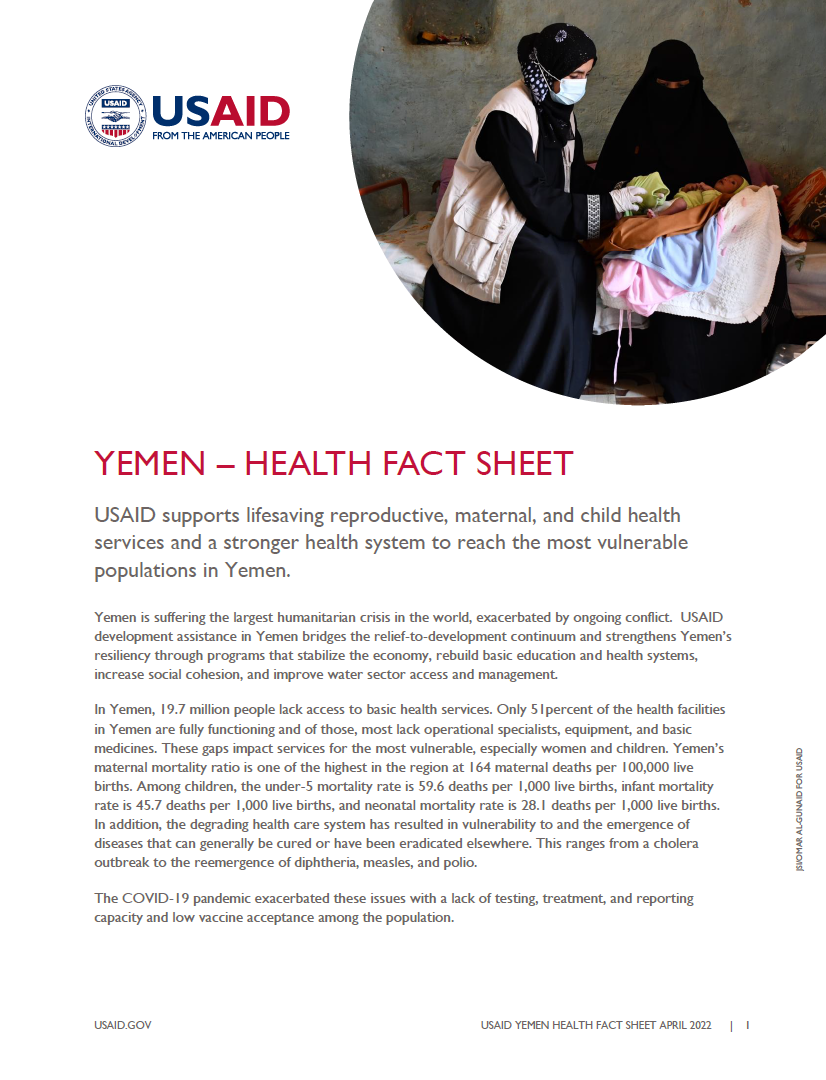Speeches Shim
USAID supports lifesaving reproductive, maternal, and child health services and a stronger health system to reach the most vulnerable populations in Yemen.
Yemen is suffering the largest humanitarian crisis in the world, exacerbated by ongoing conflict. USAID development assistance in Yemen bridges the relief-to-development continuum and strengthens Yemen’s resiliency through programs that stabilize the economy, rebuild basic education and health systems, increase social cohesion, and improve water sector access and management.
In Yemen, 19.7 million people lack access to basic health services. Only 51percent of the health facilities in Yemen are fully functioning and of those, most lack operational specialists, equipment, and basic medicines. These gaps impact services for the most vulnerable, especially women and children. Yemen’s maternal mortality ratio is one of the highest in the region at 164 maternal deaths per 100,000 live births. Among children, the under-5 mortality rate is 59.6 deaths per 1,000 live births, infant mortality rate is 45.7 deaths per 1,000 live births, and neonatal mortality rate is 28.1 deaths per 1,000 live births. In addition, the degrading health care system has resulted in vulnerability to and the emergence of diseases that can generally be cured or have been eradicated elsewhere. This ranges from a cholera outbreak to the reemergence of diphtheria, measles, and polio.
The COVID-19 pandemic exacerbated these issues with a lack of testing, treatment, and reporting capacity and low vaccine acceptance among the population.
USAID Yemen Health Fact Sheet ![]() (pdf - 320k)
(pdf - 320k)
USAID’s Response and Results
USAID’s Yemen Systems, Health, and Resilience Project (SHARP) improves maternal and child health outcomes in Yemen via a multifaceted approach. This includes: building the capacity of health facility staff and community midwives to deliver higher quality care; encouraging community engagement with the formal health system to build trust; improving district health authorities’ management skills; exploring and piloting innovative financing mechanisms to improve access to care; and strengthening Yemen’s health management information system to provide data for decision-makers. USAID health activities are active in Aden, Lahj, and Ta’izz governorates. SHARP has trained 210 community midwives and 413 reproductive health volunteers to improve access to services for women of reproductive age and children under five. SHARP also trained 97 health facility service providers on evidence-based reproductive, maternal, newborn, and child health and nutrition services to ensure provision of quality services for mothers, pregnant and lactating women, and children.
To strengthen Yemen’s response to the COVID-19 pandemic, USAID coordinated the U.S. government donation of 319,200 COVID-19 vaccines to Yemen. USAID also provided life-saving oxygen to COVID-19 isolation units, supported cold storage and transportation of vaccines, helped authorities to develop health guidelines and protocols, trained health care workers on infection prevention and control measures, and shared awareness messages through social media, radio, and community outreach to increase vaccination rates and help prevent the spread of the disease.
The USAID Strengthening Family Planning Services in Yemen project increases Yemenis’ access to family planning services in 220 health facilities across Aden, Lahj and Ta’izz governorates. Health facility work complements maternal and child health services already offered with the support of other actors enabling a “one stop shop” for Yemenis to access a wider array of health services. In Fiscal Year 2021, the project provided modern contraceptive methods to 182,225 women.
Last updated: April 25, 2022


Comment
Make a general inquiry or suggest an improvement.